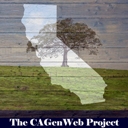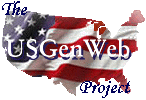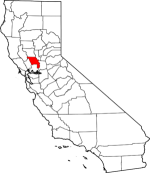|
Welcome to Yolo County CAGenWeb
Yolo
Photos at Nathan Monroe Elton website
|

Classes
of the Cacheville School,
Cacheville (=Yolo), Yolo County,
California, 1886. Nathan and Nancy
Margaret (Garred/ Gerred) Elton's three
school age children are marked with
black arrows (L to R): Ruth
"Edith" Elton , age 7, George Monroe
Elton, age 10, and Eugene Arthur Elton,
age 12. This is the only
known photo of Edith Elton, who, sadly,
would die three months after her 15th
birthday in 1894, and five months after
her father, Nathan, passed
away.

This
was the list of names associated with
the Cacheville School photo above,
starting with the bottom (first) row and
reading left to right. It is
not clear who may have been the source
for the names provided. "A.
M. Elton", ie., Arthur Monroe Elton
(1900-1982), was one of Eugene Arthur
Elton's sons.
Photo and associated list of names were provided by jdf from her mother's collection. 
Uncropped
photo of the Cacheville School,
Cacheville (=Yolo), Yolo County,
California, 1886, with annotations.

Photo
of Cacheville School pupils and
teachers, Cacheville (=Yolo), Yolo
County, California, circa 1909.
Arthur M. Elton is standing fourth from
left, front row, in overalls. His
older brother Wheadon Elton, with butch
haircut in overalls, is standing just
behind the teacher on the far right.

Cacheville
School, Cacheville (=Yolo), Yolo
County, California. Boy in
overalls, top row on left, with butch
haircut, identified as E. Wheadon Elton
(b. May 1898). If Wheadon is about
11, then the photo must have been taken
about 1909. Art M. Elton (b. Aug 1900), Whedon's younger brother, is the boy in overalls, butch haircut, second row from the bottom, third from right. This photo must have been taken on the same day as the one above it. 
Cacheville
School, Yolo, California, circa
1910. Girl standing in front row,
third from left, was identified as
Gratia Elton (b. Oct 1897).

This
is a photo of the old Levi Ranch House
as it appeared near the tiny railroad
town of Dunnigan, Yolo County,
California in late 1902 or early 1903
"on Buckeye Creek, in the foothills,
about 4 miles west" of town.
The occasion for which this photo
was taken remains unclear, but we do
know that the Eugene Elton family is
photographed visiting the Scofield
family, who, it turns out, were living
in this house at the time. The
Scofield's were somehow friends of
Eugene and Emma Elton, but exactly how
is something that I'd have to research
to find out. According to notes
dated 05 April 1963, handwritten
by Eugene's son, 3.1.3 Arthur Elton, we
have from left: Raymond
Scofield (on horse), Gratia Elton,
Eugene Whedon Elton, 2.1 Eugene Arthur
Elton (wearing hat), his wife Emma
Elton, Arthur Monroe "Art" Elton,
Ida Darling (spelling?) seated in chair,
and Margaret Ida Elton (b. June 1902),
who is the baby seated on her lap,
Myra Scofield, Bejren (or Byren)
Scofield, 2.5 Nathan Marvin ("Dick")
Elton (Eugene's 17 or 18 year old
brother), Van Allen Scofield
seated on porch, and finally Frank Allen
Scofield holding the bicycle. Art
Elton notes that as of April 5th, 1963,
he and Frank Scofield, were the only
members of this group still alive.
Emma Elton's fifth child, Myra, would be
born in Dunnigan, in January
1904.
 Undated
photo of downtown Napa, California
looking down an unidentified main
street, probably in the 1890s or very
early 1900s. It's
interesting that the Napa County
Historical Society uses this same
location from roughly the same era as
their title photo for their Facebook
page (see below). From the
San Francisco Chronicle, 11 March 1906
edition, this news flash: "The
Commerical and Savings Bank of Napa has
applied to Superior Court to change its
name to 'The Napa Savings Bank' and
April 2d has been set for hearing the
petition." The white building on
the left is a branch, and probably the
main branch, of the "Commerical and
Savings Bank" of Napa according to the
sign on the side of the building.
If so, and assuming the name change went
through that year, we can deduce that
the photo was taken before 1907.
By 16 Aug 1907 it was referred to
as the "Napa Savings Bank" in the San
Francisco Examiner.
 Historical
photo of Napa, California, downloaded
from the Napa Historical Society
facebook homepage.
 Main
Street, Yolo, Yolo County, California,
as it looked on a postcard from the
1910s or 1920s. Main road
through town was still unpaved. No sign of utility poles (phone, electric, etc.). By November 1919, the village formerly known as Cacheville, had been renamed Yolo according to the Woodland Daily Democrat. In July 1915 it was still referred to as Cacheville in the Woodland paper. There is a reference to the town as Cacheville as late as June 1919.  Gathering
of Cacheville (=Yolo) folk at Mary's
Chapel, Yolo, California circa
1894. Although several Eltons are
buried at Mary's Chapel cemetery, they
attended the Methodist Episcopal church
in town. But this is how they
would have looked in their Sunday best.
 Downtown
Napa, California sometime in the 1940s.
***
The
following is a transcript of a letter
written by Julia (Buckland) (Fellows)
Wheadon (or Whedon), originally from
up-state New York near the Canadian
border, from her brother's home in Elko
County, Nevada, dated October
1872. At age 35, she had left an
abusive husband back in New York, and
taken her daughter, Myra, to spend some
time out West. The historical
value of the letter lies in her
harrowing account of one or more
encounters with hostile Indians of the
Blackfoot Confederation while traveling
through Montana sometime between the
fall of 1869 and the summer of
1872. This letter was preserved by
Arthur Monroe Elton, her grandson, and
was contributed by jdf from her mother's
collection.
Mound Valley Elko Co. Nevada, Oct. 1872 Dear John [apparently a nephew of Julia's], I will commence a letter to you after waiting a long time, let me see. You wanted me to describe my journey. John, if I could tell you [a] quarter of what has happened, and such things as I have seen, you could not think it true. When I came to Montana I came up the [Missouri] river. 'Twas three months and over coming to Benton's [Fort Benton, Montana]. We got along very nicely until we came to Muscle Shell. Then the Indians commenced to get bad. John, if you could only see them. While they were a little civilized, they had a few rags on them, and when we come to Muscle Shell, they had not an article, were painted red and some were striped with black. When we had to stop for wood there were hundreds on the bank, old and young, 'twas very funny [read: strange], [and] at the same time a very ridiculas [sic] sight. They fired into the boats and then we had to wait until all the boats came up out in [sic: of] the river. Then we kept together and left all our freight at Cow Island, and burned lard, bacon, and any thing until we got where we dare stop for wood. Now I am going to tell you my experience with Indians. I'll not tell it as bad as it was. 2 When I first came to Montana I stayed a year with a family by the name of Haskell, and no one on earth had better friends then they were to us. Well, we lived at the Missions. The Peagans [sic: Piegans] and Blackfeet were all around but old father Van Sorp, an Irish Priest, was converting them at the Missions where we lived. One day [Albert Haskell] went or started to go to town to sell a load of hay, Albert Haskell did. He came home running his team without his load, he said bar the doors the Indians were murdering all the whites, and going to sweep the Valley. He was going to raise help, and [said to] keep them out for an hour, and he would be back. 3 I took the eye glasses and the old man helped me up on a hay stack to watch. They had killed a great white man, that was old Clark or Col. Clark [Major Egbert Malcolm Clarke, famous 19th century Montana settler, b. 1817 in Indiana, West Point graduate, who, after serving with Sam Houston in Texas and subsequently working for the American Fur Company for many years in Montana, was killed 17 August 1869 by Owl Child, a Piegan Indian and relative of his first wife, at a ranch just north of Helena]. If you have read any [news]papers, you have heard of him. He was married to Black Bear, a medicine squaw, and his daughter is the teacher in the [sic] reading at Helena [Montana]. They had three prisoners and were killing Haskell's calves and roasting them. I could see and tell Haskell the names of all [the calves] that were killed. This was a field glass and one could tell cattle 6 miles off, but the Indians were only about 1 mile. I told Haskell I was sick. I crawled off the stack, but they had to help me in. It blew a little and looking through the glass made me sea sick. I laid down and could not walk for 3 hours. Albert came home in about half an hour, they [had] shot his horse and killed her and shot him a piece of his ear, 4 and he sent an Indian that I had put buttons on his sleeves, and gave him a brass ring for help, promised him his white squaw, that was me [Julia], if he would save us. He did save us. He got help, but they killed him, and hung him up in a tree, the Indians did, for they knew he went for help. The Indians came, about twenty. Mrs. Haskell made bullets, and Myra [Julia's daughter] handed them to me, and they fired from the shed and I was so very sick, I could only vomit up my boots. About this time the old man said he could do no more. We heard shots and yells, I shall hear them forever, and 50 men from Helena came, they went to meet the others and killed some, and they stayed with us until morning. Then we went to Silver City and I went to Salitoss Valley to the family I came to Montana with. I stayed a year, then the Indians got so bad we had to go into Bozeman's [Bozeman, Montana], 5 and I came to Virginia [Virginia City, Montana], then I felt some safer and now I am to John's [at John's, Julia's brother] and there is no end to them [ie., Indians]. John says they are friendly, but there is none good. When he is away to work, they come grinning around. I pull in the string and keep still, but I am afraid. I do not tell John but I live in fear all the time. I'll have to make another move, I dare not live where they are, and now, John, it will take you a week to read this. I have told you about Indians, now I will tell you about the country. 'Tis all mountains and sage brush, there is snow in sight the whole year round. When [it] is sunshine in the valley 'tis snowing or raining in the mountains. And such splendid sunsets. It seems as if the sun rested on the mountains. Now I must tell you about the springs, the hot springs in Montana I went to see and took a bath. One place 'tis warm enough to wash dishes, then it gets hotter 6 [and] I cooked an egg in ten minutes, then it boils and smokes like there was a fire made it and I think before long there will be earthquakes as there is in California. Then I took a vapor bath, then I bathed in the sulphur springs. Now if John does or does not come home, I expect to visit California, and Sanbarine [San Bernardino?] and then come east some where. Now John, write me everything a long letter. Commence Monday morning and write a little each day, and I am, I will write you soon. Ella, little Julia, I will write to you, and Julia look out for a nice little something when John comes. Myra wants to see you, she is a good scholar, and writes very well, but I do not mean any of you shall see her writing. I'll surprise you with a Montana girl, that is a scholar some day. Good bye children one and all. Always remember your Aunt Julia. Sister Vick, one word, John got Ma's letter yesterday. 7 I never saw a pleased a person as he is. Vick, keep at him. I say all I dare but I get all provoked when he says that next year I'll go. But have Ma write again, and tell him she is not letting any one have her place, for she is sure he is coming. I don't want him to know. I never say a word about his coming. I told him I would write to the children, but I would never write again that we had better never write, than for him not to go. Tell him Ma is looking for him, and get Mary Jane to write to him. He says she is mad because he has never wrote. All pickens [?] and direct to him, it does him so much good to get a letter. He was away threshing when he got your letter, he came home at noon with a letter sticking out of his pocket. He reads them over about every hour for a while. John, write to him, tell me where Mary is and I will write to her. 8 Now, Orsome [Orson], write to John, and Julie [write him] to [sic]. I'll never forget you. Orsome offered to send me some money. I'll remember. I am coming to see you some dark night. And Mrs. Corby, don't you want to see me. I know you do, and let me see, Vick, I know you had a baby between Julie's and your little boy. You spoke of her, what is her name? Tell Ma, I do want to see her, and will. I am going to write to her soon, but I won't let John know. Tell her to write to John, never mind if he don't write. We will keep at him. Send him a letter every week, someone. Orsome, do write to him. Goodbye, ain't you glad I have no more paper, Julia [AME writes: This is a copy of a letter written by my Grandmother, Julia Buckland (Fellows, Whedon)]. [signed Arthur M. Elton]. 
Postcard.
En Route to Goldfield Nevada, 1905.
|
©
CAGenWeb All Rights
Reserved.
This page last updated:


